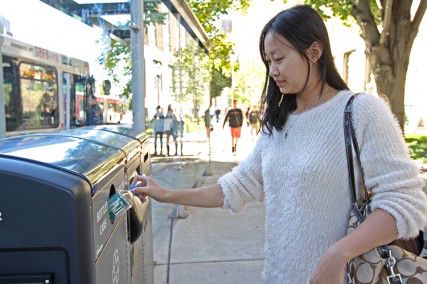
Trying to compromise on the reformation of the Massachusetts bottle deposit law, two opposing parties attempted to reach a negotiation at a hearing on Sept. 17 at the Massachusetts State House about expanding the five-cent bottle deposit to include a wider variety of bottles and a new distributor tax.
“We’re looking to increase the amount of containers that can be redeemed and to encourage a larger number of people to recycle,” said Jack Clarke, director of public policy and government relations at the Massachusetts Audubon Society, “[The Mass. Audubon Society] thinks the updated bottle bill for Massachusetts that would include on-the-go drinks would be a good complement to curbside recycling.”
Greg Cooper, deputy director of consumer programs at the Massachusetts Department of Environmental Protection, said the bottle bill is an effective recycling tool that benefits the community.
“The bottle deposit law has been around for nearly 30 years and it has achieved the highest recycling rate of any material that we are attempting to recycle,” he said. “On average, [the Mass. DEP] estimates that about 80 percent of all bottles and cans with the five-cent deposit are recycled.”
The original Bottle Bill was implemented in 1983 and instituted the five-cent deposit on bottles and cans, but was only applied to carbonated beer, soda and malt beverages. Supporters of expanding the bill would widen the law to include water, tea, fruit drinks, coffee and sports drinks to the deposit.
The bottle bill has also served as an effective litter reduction tool, helping to keep the streets clean of bottles with the five cent deposit by offering consumers an opportunity to gain back part of their expenses, Cooper said. Bottles with the five-cent deposit are recycled at approximately double the rate of bottles without a deposit, he said.
“The fact that the recovery rate is so much higher shows that if you put a financial incentive on recycling, it will be more broadly accepted and will see more success, he said.
Some opponents of expanding the law said they see the current recycling system as outdated and want to change the way the recycling system is handled.
Christopher Flynn, the president of the Massachusetts Food Association, said the extensive recycling programs in place today make the five-cent deposit unnecessary from a recycling standpoint.
“When the current bottle law passed, there wasn’t the comprehensive recycling infrastructure that’s in place today,” he said. “90 percent of the state’s residents have available to them either curbside or drop-off recycling programs, and in this day and age, it really doesn’t make any sense to separate your trash and drag half of it back to a food store.”
Bill Vernon, the Massachusetts director of the National Federation of Independent Businesses, said the presence of bottle return systems in stores is detrimental to business.
“The impact on the small stores is that an additional area of the store would have to be used for redeemables … it’s a major expense, it doesn’t help stores make any money in that particular area, it’s a cleanliness problem and takes away from what [the stores] are trying to do in the rest of the store, which is sell food,” he said.
Mass. Rep. John Binienda and Mass. Sen. Michael Moore have proposed an alternative to the expanded bottle bill, which would replace the five-cent deposit in favor of a one-cent tax on every bottle paid by the bottlers and distributers.
“I think the bottle bill served its purpose and was successful when it was originally proposed and implemented, but we should always be looking for ways to improve on current practices,” Moore said. “We should be concentrating on a more comprehensive approach on recycling.”
Despite opposition to the expansion of the bill, Clarke said bottle deposits are still viewed by many as a good source of recycling and should be continued in order to keep recycling rates high.
“We don’t need one method in exclusion of the other,” he said. “We need to increase both, we need to increase the amount of containers that are subject to redemption and we need to increase the amount of containers that are subject to recycling.”























































































































alfredo • Sep 30, 2013 at 11:51 am
the bottle bill is the way to go. new jersey has stopped this methodolobgy nearly 30 years with a high tax on litter generating products. This tax is costly, and the recycling rates in new jersey for bottles cand cans has decreased.. all commingled glass is sent to landfills as landfill cover and base.. we need a national bottle bill..
Tim Pecci • Sep 27, 2013 at 4:02 pm
Expanding the Bottle Bill will save cities and towns a lot of tax dollars in recycling and litter pick-up. Consumers will have the choice to redeem their bottles or to put them in their curbside recycling. This would be a win for residents of Massachusetts.
Maureen at American Beverage Association • Sep 25, 2013 at 2:35 pm
Expanding the variety of bottles that require a deposit will only take a toll on hard-working consumers and our economy. Hard-working citizens don’t need another cost to contend with and small businesses and the jobs they provide could be negatively impacted too.